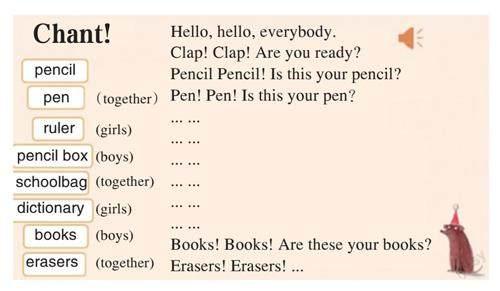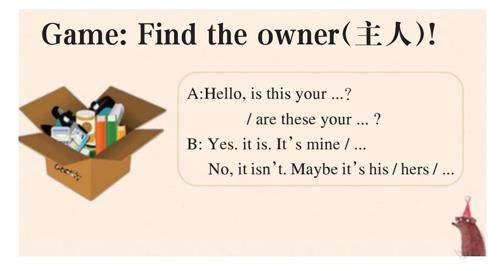Fun Finding:基于核心素养的初中英语听说游戏活动设计
2023-03-19樊秒
樊秒



【摘要】 本文以“Fun Finding”听说课为例,Fun指游戏课堂的趣味性,Finding 既指向“Is this your pencil?”课例的话题“寻找失物主人”,也指学生在课堂游戏中找到了学习的快乐,旨在探讨如何通过英语听说游戏活动增加课堂的趣味性。
【关键词】 乐学善学;游戏活动设计;英语听说教学
一、调查与现状
(一)调查
《义务教育英语课程标准(2022年版)》核心素养总目标中提出,“学生具备英语学习能力,意味着学生在英语学习方面乐学善学。这要求学生对英语学习有正确的认识和持续的兴趣,有积极主动的学习态度和学习动力”。针对我校初一学生对英语学习的态度看法,笔者进行了一次“关于初一学生英语课堂体验”的问卷调查。
从调查结果来看:58.3%的学生觉得英语课很有趣;20%的学生缺乏英语学习兴趣;对待学习中的困难,只有23.5%的学生能以正确态度对待和克服;在英语课上能积极主动举手的学生仅有47.4%。
(二)现状
在调查中笔者发现,有相当一部分学生由于缺乏对英语学习的浓厚兴趣,在英语课堂学习中显得被动。当他们在英语学习中遇到困难时,更多地会选择消极回避,而不是自主思考,解决问题。面对此类问题,新时期教师要设计有趣的课堂活动,提高课堂吸引力,唤醒学生的英语学习热情。
二、如何在初中英语听说教学中设計游戏活动
(一)营造情境,导入话题
从单元目标分析,Unit 3 Is this your pencil?围绕“失物”展开,旨在确认物品的所属关系(identify ownership)。换言之,学生要能辨析物品的所属关系,从而强化对自己物品的所属权意识。本节课是一个故事,在故事的开始,笔者以“在路上捡到一个书包,课堂上寻找失主”导入,展开教学。在故事结尾,笔者在书包里找到一张ID card,并据此找到了书包主人,提醒学生:捡到失物,第一时间在失物上找线索,以便于及时归还失主。
【教学片段】 Lead-in
The beginning of the story:
T: Good morning, class. Im sorry to be late for the class. Because on the way here, I have found a schoolbag. So is this your school bag? (Ask several students about whether it is their schoolbag)
T: All right, I see. This is not your schoolbag. Then maybe we can help the schoolbag find its owner. You see, the bag is black.
T: Maybe we can have a look what are in the schoolbag. The things inside may give us some ideas. (Learn some new words about school things)
The end of the story:
T: Sometimes, the school thing will tell us something about its owner. In fact, look carefully into the schoolbag, I find an ID card. Its Marks schoolbag. I will give it back to Mark after class.
(二)调动多感官参与听说教学
1. 多感官参与的机械操练
听说教学无法规避机械操练,语言知识的掌握避免不了反复、强化、记忆。在听说教学中,教师借助多媒体影音工具,将机械操练与游戏活动有效结合,充分调动学生眼、口、手多种感官参与学习,促使学生乐学善学,主动发展。
在本课时的语言知识操练中,笔者将其编成chant,附上律动十足的音乐,学生分组诵读,抑扬顿挫,大大增加了趣味性。
【教学片段】 将单词、句型编成chant
T: Hopefully you are nice enough to help me introduce the schoolbag to other students. Can you have a try? (Students introduce the things in the schoolbag)
T: All right, look at the blackboard. Since we have learnt some new words and sentences, maybe we can make them into a chant.
【教学片段】 “I Act You Say”游戏进行名词性物主代词的感知教学
T: Here you see, “mine” means my pencil. (Use body language to show “mine”) Then how about “his” “yours” “hers” “ours” “theirs”...?(Teacher uses body language to make students guess the nominal possessive pronoun)
T: Now, I act and you guess! Are you ready?
【教学片段】 “Look and guess”看图猜测
T: In fact there are also something of mine in the classroom. Now I will show you part of them. And you can have a guess, what are they? Use “Is this your ... / Are these your ...?”
T: Here, I have also got something from you. But I cant remember their owners. Can you help me?
2. 腦参与的思辨游戏
初中生的思维从具体逻辑思维转向抽象逻辑思维,好奇心强,求知欲旺。笔者在对班级学生进行问卷调查后发现,班级45位学生中,有37位学生对于“推理”类游戏活动热情极高。因此,在听说教学中,如何利用“信息沟”,让学生动脑思考,解决问题,获得成就感,掌握目标语言很重要。
鉴于问卷反馈,笔者在听说教学中设计“推理”游戏,增加教学的趣味性。
【教学片段】 听前预测(观察图中人物的手势,猜测可能谈论的物品)
T: But up to now, we havent found the owner of the bag. Maybe we can walk into the classroom to ask more students. Look at the picture, what do you think of the classroom?
Ss: Its untidy.
T: Look at the students, what are they talking about? Maybe you can look at their fingers, they are pointing at something. So what are they talking about? For example, the boy in yellow, can you guess what he and his teacher are talking about?
T: Sometimes we can use our body language to show something. What school things can you see in the classroom?
【教学片段】 基于主人基本信息,推测失主
T: Thanks to your help, I have found the owners of these school things. And now, there are still four students who need our help. Lets first welcome them to the class! (PPT呈现四位学生的基本信息)
T: You can find some basic information of the four students. And each of them lost some of their school things. Can you help them with the things in your hand?
T: Now, six students a group. Suppose four of you are Bob, Mary, Helen or Mark (According to the card you get). And the rest of you can guess something from the lost things in your hand, and make a conversation with the owner you think.
三、游戏教学的注意事项
(一)游戏活动的有效性
有效性是指课堂游戏活动的设计必须在一定时间内,有效利用指向本节课教学目标的语言,进行游戏活动。在游戏设计教学过程中,笔者遇到过以下问题:
1. 游戏指令过于复杂
过于复杂的游戏指令会大大降低课堂效率,使课堂环节严重拖拉,有时甚至不能完成本堂课的教学任务。
2. 游戏时间过于拖沓
在游戏教学实施中,学生从一开始试探性地参与游戏,到掌握语法规则,参与度逐渐提高;当学生可以熟练使用语法规则参与游戏时,教师应该及时终止这一环节活动,以免过度消耗学生的课堂热情,以及造成后期活动时间紧张。
(二)游戏活动的多样性
初中生好胜心强,对新鲜事物充满好奇,同时善于应对挑战。基于初中生的心理特点,在设计教学活动时,教师不仅要注意游戏的多样化,还要注重互动性操练游戏和启发性思维游戏的有效结合,从而提高课堂效率。
(三)游戏活动的竞争性和激励性
课堂游戏活动的设计要有趣,能吸引学生;要有竞争性,能激发学生的竞争意识。这样能让学生积极主动地参与游戏。同时,教师要对游戏结果进行积极的评价,更要注意对失败的学生进行鼓励,保持学生参与游戏的持久兴趣。
四、游戏活动设计的课后延伸
笔者观察到,每次交换考场考试之后,班级讲台上会出现不少无名文具。课后,笔者将这些失物分给各个英语小组,学生根据失物推测主人(班级、性别等),用英语询问失主的可能对象,从而解决实际问题。
为了更好地达成游戏课堂的有效性、多样性、竞争性和激励性,笔者在教室内设置英语课堂游戏榜单,对学生的游戏得分进行进阶性评估,评估段位有“王者”“钻石”“铂金”“黄金”以及“白银”,学生凭借课堂游戏表现,进阶得分。
五、结语
游戏是人生不可缺少的活动,不管年龄、性别,人们总是喜欢游戏的。将游戏适时、适势地融入英语教学中,学生的学习会变得更有趣、高效。
参考文献
北京市教育科学研究所.陈鹤琴教育文集:上卷[M].北京:北京出版社,1983.
